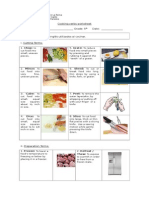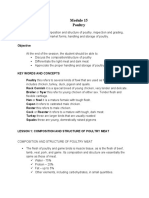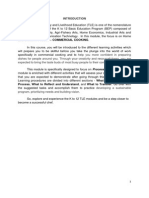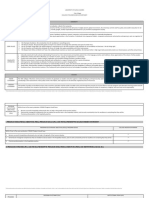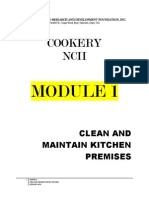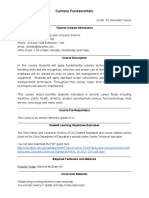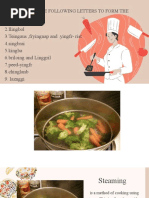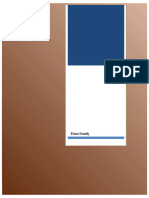0 ratings0% found this document useful (0 votes)
174 viewsCooking Method
Cooking methods are classified as either moist heat or dry heat. Moist heat methods use water or other liquids to conduct heat to foods, such as poaching, simmering, boiling, steaming, braising, and stewing. Dry heat methods use hot air, metal, radiation or fat to cook foods without moisture, including roasting, baking, grilling, broiling, griddling, sautéing, pan-frying, deep-frying, and pressure frying. Microwave cooking refers to using microwave radiation for heating rather than traditional moist or dry heat methods.
Uploaded by
Mabelle Jan AbatayoCopyright
© © All Rights Reserved
Available Formats
Download as PPTX, PDF, TXT or read online on Scribd
0 ratings0% found this document useful (0 votes)
174 viewsCooking Method
Cooking methods are classified as either moist heat or dry heat. Moist heat methods use water or other liquids to conduct heat to foods, such as poaching, simmering, boiling, steaming, braising, and stewing. Dry heat methods use hot air, metal, radiation or fat to cook foods without moisture, including roasting, baking, grilling, broiling, griddling, sautéing, pan-frying, deep-frying, and pressure frying. Microwave cooking refers to using microwave radiation for heating rather than traditional moist or dry heat methods.
Uploaded by
Mabelle Jan AbatayoCopyright
© © All Rights Reserved
Available Formats
Download as PPTX, PDF, TXT or read online on Scribd
You are on page 1/ 24
COOKING METHODS
Cooking Methods
- are classified as moist heat or dry heat
Moist-heat method are those in
which the heat is conducted to
the food produce by water or
water-based liquids such as
stock and sauces, or by steam.
Cooking Method
- are classified as moist heat or dry heat
Dry-heat method are those in
which the heat is conducted
without moisture—that is, by
hot air, hot metal, radiation or
hot fat.
Moist-Heat Methods
Poach, Simmer, and Boil
Poaching, simmering, and boiling all
involve cooking a food in water or a
seasoned or flavoring liquid.
The temperature of the liquid determines
the method.
Moist-Heat Methods
Boiling
1. To boil means to cook in a
liquid that is bubbling rapidly
and greatly agitated.
No matter how high the burner is turned,
the temperature of the liquid will no go
higher.
Moist-Heat Methods
Simmering
2. To simmer means to cook
in a liquid that is bubbling
gently at a temperature of
about 85 degrees to 96
degrees.
Moist-Heat Methods
Poaching
3. To poach means to cook in a
liquid, usually small amount, that is
hot but not bubbling.
Temperature is 71 degrees - 82 degrees
Moist-Heat Methods
Blanching
4. To Blanch means to cook an
item partially and briefly,
usually in water.
Moist-Heat Methods
Steam
To steam means to cook food
by exposing them directly to
steam.
Moist-Heat Methods
Braising
To braise means to cook covered in
a small amount of liquid, usually
after preliminary browning.
Braising is used for large cut of meat.
Moist-Heat Methods
Stewing
To stew means to cook covered in a
small amount of liquid, usually after
preliminary browning. The same
with braising but……
Stewing is used for smaller items.
Dry-Heat Methods
Roast and Bake
To roast and bake both mean to
cook food by surrounding them
with hot, dry air, usually in an
oven.
Dry-Heat Methods
Roasting and Baking
Roasting applies to meats and
poultry.
Baking usually applies to breads,
pastries, vegetable and fish.
Dry-Heat Methods
Barbecue
To barbecue means to cook with dry
heat created by the burning of
hardwood or by hot coals of this
wood.
Barbecuing is a roasting or grilling
technique requiring a wood fire.
Dry-Heat Methods
Broiling
To broil means to cook
with radiant heat from
above.
Dry-Heat Methods
Grilling
Grilling is done on an open grid
over a heat source, which maybe
charcoal, an electric element, or
a gas -heated element.
Dry-Heat Methods
Griddling
Griddling is done on a solid
cooking surface called a griddle,
with or without small a mount of
fat to prevent from sticking.
Dry-Heat Methods Using Fat
Sautéing
To sauté means to cook quickly
in a small amount of fat.
The French word sauter means “to
jump,” referring to the action of
small pieces of food tossed in a sauté
pan.
Dry-Heat Methods Using Fat
Pan-Frying
To pan-fry means to cook in a
moderate amount of fat in a pan
over moderate heat.
Pan-frying is similar to sautéing
except more fat is used and the
cooking time is longer.
Dry-Heat Methods Using Fat
Deep-Frying
To deep-fry means to cook a
food submerged in hot fat.
Dry-Heat Methods Using Fat
Deep-frying
High quality in a deep-fried product is
characterized by the following properties:
A. Minimal moisture loss
B. Minimal fat absorption
C. Attractive golden color
D. Crisp surface or coating
E. No off-flavors imparted by the frying fat.
Dry-Heat Methods Using Fat
Pressure frying
Pressure frying means to deep-
frying in a special covered fryer
that traps steam given off by the
food being cooked and increases
the pressure inside the kettle.
Microwave Cooking
Microwave cooking refers to the use of a
specific tool rather than to a basic dry-heat
or moist heat cooking method.
Microwave oven is used mostly for
heating prepared foods and for thawing
raw or cooked items.
END
You might also like
- BTLE 30173 Principles of Food Preparation IMNo ratings yetBTLE 30173 Principles of Food Preparation IM163 pages
- Basic Cooking: Preparation and Cooking FoodNo ratings yetBasic Cooking: Preparation and Cooking Food6 pages
- Principles of Food Selection, Preparation and ServiceNo ratings yetPrinciples of Food Selection, Preparation and Service4 pages
- Introduction To Lebanese Cuisine: Lebanese Cuisine Is A Festival of Delicious Appetizers, RichNo ratings yetIntroduction To Lebanese Cuisine: Lebanese Cuisine Is A Festival of Delicious Appetizers, Rich5 pages
- SYLLABUS Culinary Arts I (Revised 2017)No ratings yetSYLLABUS Culinary Arts I (Revised 2017)16 pages
- Professional Cookery Manual Sinhala Part 2No ratings yetProfessional Cookery Manual Sinhala Part 2160 pages
- San Antonio de Padua College Pila, Laguna Basic Education DepartmentNo ratings yetSan Antonio de Padua College Pila, Laguna Basic Education Department3 pages
- True/False: Indicate Whether The Statement Is True or FalseNo ratings yetTrue/False: Indicate Whether The Statement Is True or False5 pages
- Methodsofcooking 151129141711 Lva1 App6892100% (1)Methodsofcooking 151129141711 Lva1 App689263 pages
- Dokumen - Tips - Tle K 12 Bread and PastryNo ratings yetDokumen - Tips - Tle K 12 Bread and Pastry79 pages
- Copia de Activity - 3 English IV R-3-2021No ratings yetCopia de Activity - 3 English IV R-3-20217 pages
- Mga SALITANG TAGALOG Set 1 (English-Tagalog Words)No ratings yetMga SALITANG TAGALOG Set 1 (English-Tagalog Words)8 pages
- At The End of The Lesson 80% of The Student Should Be Able ToNo ratings yetAt The End of The Lesson 80% of The Student Should Be Able To6 pages
- TS - U5 - WQ (WWW - Languagecentre.ir) MICHAELNo ratings yetTS - U5 - WQ (WWW - Languagecentre.ir) MICHAEL2 pages
- Building and Grounds Maintenance ChecklistNo ratings yetBuilding and Grounds Maintenance Checklist2 pages
- Ground Floor Plan Second Floor Plan: Master'S T&B Dirty Kitchen Bedroom 4 GYMNo ratings yetGround Floor Plan Second Floor Plan: Master'S T&B Dirty Kitchen Bedroom 4 GYM1 page
- Detailed Quotation for Restaurant Interior Design0% (1)Detailed Quotation for Restaurant Interior Design4 pages
- Job Completion Report For Claeaning of ExhaustNo ratings yetJob Completion Report For Claeaning of Exhaust11 pages
- Dawlance Home Appliances SBS Promotion 08 AUG 24 1No ratings yetDawlance Home Appliances SBS Promotion 08 AUG 24 12 pages
- Microflats For You: 1. Microflats. The Advert and Answer The QuestionsNo ratings yetMicroflats For You: 1. Microflats. The Advert and Answer The Questions2 pages
- Compare Price PAC Project Bank Sampoerna CibuburNo ratings yetCompare Price PAC Project Bank Sampoerna Cibubur1 page
- #0.07 Room Service - All Day PhraseologyNo ratings yet#0.07 Room Service - All Day Phraseology3 pages
- ACADEMIC YEAR - 2013-2014: Subject Code: Cfpp11 EXAMINATION DATE: 25.11.2013No ratings yetACADEMIC YEAR - 2013-2014: Subject Code: Cfpp11 EXAMINATION DATE: 25.11.20132 pages
- This Is For You.: Write A Suitable Response For Each Picture in The Space Provided100% (1)This Is For You.: Write A Suitable Response For Each Picture in The Space Provided5 pages
- Principles of Food Selection, Preparation and ServicePrinciples of Food Selection, Preparation and Service
- Introduction To Lebanese Cuisine: Lebanese Cuisine Is A Festival of Delicious Appetizers, RichIntroduction To Lebanese Cuisine: Lebanese Cuisine Is A Festival of Delicious Appetizers, Rich
- San Antonio de Padua College Pila, Laguna Basic Education DepartmentSan Antonio de Padua College Pila, Laguna Basic Education Department
- True/False: Indicate Whether The Statement Is True or FalseTrue/False: Indicate Whether The Statement Is True or False
- Mga SALITANG TAGALOG Set 1 (English-Tagalog Words)Mga SALITANG TAGALOG Set 1 (English-Tagalog Words)
- At The End of The Lesson 80% of The Student Should Be Able ToAt The End of The Lesson 80% of The Student Should Be Able To
- Ground Floor Plan Second Floor Plan: Master'S T&B Dirty Kitchen Bedroom 4 GYMGround Floor Plan Second Floor Plan: Master'S T&B Dirty Kitchen Bedroom 4 GYM
- Dawlance Home Appliances SBS Promotion 08 AUG 24 1Dawlance Home Appliances SBS Promotion 08 AUG 24 1
- Microflats For You: 1. Microflats. The Advert and Answer The QuestionsMicroflats For You: 1. Microflats. The Advert and Answer The Questions
- ACADEMIC YEAR - 2013-2014: Subject Code: Cfpp11 EXAMINATION DATE: 25.11.2013ACADEMIC YEAR - 2013-2014: Subject Code: Cfpp11 EXAMINATION DATE: 25.11.2013
- This Is For You.: Write A Suitable Response For Each Picture in The Space ProvidedThis Is For You.: Write A Suitable Response For Each Picture in The Space Provided



